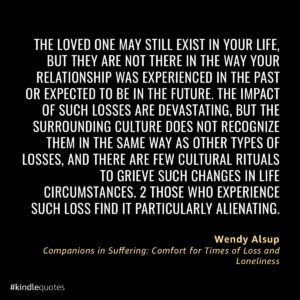Ambiguous loss, a term coined by psychologist Pauline Boss, is a loss that occurs without closure or clear understanding. This complicates the grieving process and often results in unresolved or “frozen” grief.
There are two types of ambiguous loss:
- Physical absence with psychological presence
- Psychological absence with physical presence
The first type occurs when someone is no longer physically present in your life, but they are still alive (or their death cannot be verified). Examples of this include divorce, kidnapping, or those who have gone missing during a natural disaster, war, or terrorist attack.
*Disclosure: This post contains affiliate links. Read our full disclosure policy here.
The second type occurs when someone is still physically present in your life, but they are no longer present psychologically. This can occur with dementia, mental illness, a traumatic brain injury, or addiction. The person is still in your life but they do not seem like the person they used to be.
Both types of ambiguous loss differ from ordinary loss. With a traditional loss (when someone has passed away and their death has been verified), we often know what to do.
We send cards and flowers, offer our condolences, attend funerals, and perhaps bring over a lasagna or offer to babysit someone’s kids.
We expect people to mourn when someone they love dies.
We anticipate that there will be a grieving process, and that the person will experience sadness, loneliness, anger, stress, and other negative emotions.
Conversely, we don’t know what to do when someone experiences ambiguous loss. We don’t bring over a lasagna when an addict starts using drugs again. We don’t send flowers when a friend’s parent is diagnosed with dementia.
We don’t expect someone to grieve over a divorce or breakup in the same way we’d expect someone to grieve over the death of a spouse. We likely expect them to be sad, but we probably perceive it as “not as bad” as it would’ve been if the spouse had died.
We don’t know what to do when someone we love experiences ambiguous loss because we don’t even recognize that it’s happening.

Ambiguous Grief in a Pandemic
Ambiguous grief often applies to people, but it can also apply to situations. We can grieve when we lose a job or when we’re diagnosed with a serious illness. During a pandemic, many of us have been grieving the loss of “normal” without even realizing it.
Think about how many things you miss right now. I miss seeing friends and relatives in person, I miss going to church every Sunday, I miss yoga class, I miss being able to RSVP to an event without weighing the pros and cons of going, and I miss being able to go wherever I want without even thinking about it.
Many of us may feel guilty for experiencing sadness or grief when we’ve been so fortunate. If we haven’t lost anyone to COVID-19, what right do we have to grieve? Other people have it much worse, right?
Brene Brown says, “Comparative suffering is rooted in the myth that empathy is finite.” We can feel empathy for those who have lost loved ones to COVID-19 AND at the same time feel compassion for ourselves.
We have ALL been impacted by this pandemic in some way or another, and it’s okay to grieve what we’ve lost.
Coping With Ambiguous Loss
Dr. Pauline Boss has outlined four steps for coping with ambiguous loss.
- Name it and normalize it.
- Find help.
- Celebrate what remains.
- Discover new hope for the future.
The first step for coping with ambiguous loss is to name it and normalize it. Recognize that what you’re experiencing is grief and that it’s a completely normal reaction to a difficult situation.
It’s okay to feel sad, angry, anxious, stressed, and whatever other emotions you’re feeling. Allow your emotions. Resisting them or trying to numb them (with alcohol, food, etc.) will only make them worse. Accept your feelings, and eventually, they will pass. When they come up again, allow them.
Remember that your experience of grief may look different than the experience of those around you. Maybe you tend to feel anxious, whereas someone else that you know may often feel angry. That’s okay.
People experience grief differently and no two experiences will look exactly the same. Accepting this will bring you peace.
The next step for coping with ambiguous loss is to find help. Get a therapist, join a support group (there are many online options right now during the pandemic), or read books about ambiguous loss. Dr. Pauline Boss offers a number of books on this topic.
Remember that you are not alone. While society as a whole lacks awareness and understanding around the topic of ambiguous loss, there are other people who have been through what you’re going through.
The third step is to celebrate what remains. For example, maybe your parent with dementia can no longer be the person you have long conversations with, but perhaps you can find a fun activity to do together.
If you’re feeling grief during the pandemic because you miss social connection, celebrate what connections you do have. Cherish your phone calls, FaceTime chats, and virtual board game nights.
Remember that it’s okay to feel more than one emotion at the same time.
You can feel sadness and grief about not seeing your loved ones in person AND be thankful for the technology that allows you to communicate with them virtually.
The last step is to discover new hope for the future. Once you become more comfortable with uncertainty and ambiguity, you’re free to discover new sources of hope.
This could look like finding a new hobby you enjoy (something we’re doing a lot of during this pandemic!), starting a new job, making a new friend, or leaning on your faith.
Finding Hope
Whatever struggle you’re facing right now, please know this: you are not alone.
God is always with you and there is always hope.
“Therefore you too have grief now; but I will see you again, and your heart will rejoice, and no one will take your joy away from you.” – John 16:22




Recent Comments